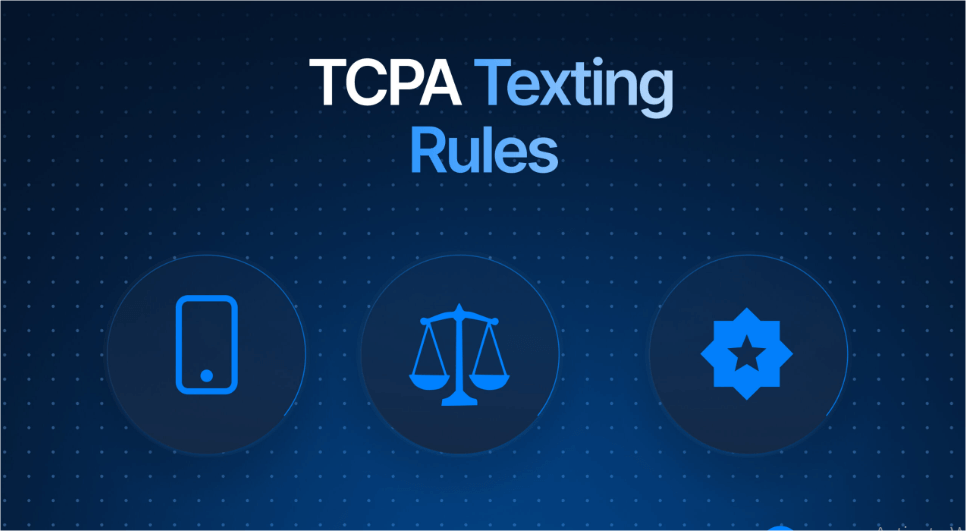📑Table of Contents:
- Why Compliance Matters in SMS Marketing
- Understanding the TCPA
- How AI is Changing SMS Marketing
- Legal Risks of AI-Driven SMS
- Balancing AI Innovation with Legal Compliance
- The Role of AI in Smarter Compliance
- Real-World Examples of SMS Compliance Issues
- The Future of SMS Compliance in an AI World
- Final Thoughts

SMS marketing has evolved into one of the most powerful tools for businesses. With open rates above 90%, it delivers reach and speed that few other channels can match. Yet, with great power comes great responsibility. Regulatory frameworks like the Telephone Consumer Protection Act (TCPA) set clear rules. At the same time, artificial intelligence is transforming how brands create, send, and manage SMS campaigns. This combination raises new challenges that every marketer must understand.
In this guide, we’ll break down why compliance matters, what the TCPA requires, how AI adds both value and risk, and strategies to navigate legal challenges with confidence.
Why Compliance Matters in SMS Marketing
Non-compliance is costly. TCPA lawsuits often result in damages of $500 to $1,500 per text message. For large campaigns, the numbers can spiral into millions. Beyond money, a lawsuit damages trust and reputation. Customers who feel spammed or misled rarely return.
Compliance also helps businesses build long-term relationships. When people trust that your messages are legal, transparent, and respectful, they are more likely to stay subscribed. Respecting laws isn’t just about avoiding penalties—it’s about building credibility.
Understanding the TCPA
The TCPA, passed in 1991, originally focused on robocalls and fax machines. Today, it is the primary law governing SMS marketing in the United States. Here are the core requirements:
- Consent is mandatory: Businesses must obtain express written consent before sending marketing texts.
- Clear disclosures: Customers must know what kind of messages they are signing up for.
- Opt-out options: Every message must include instructions on how to stop receiving texts.
- Restricted hours: Marketing texts should not be sent before 8 a.m. or after 9 p.m. in the recipient’s time zone.
- Record-keeping: Brands must document consent to protect themselves from legal disputes.
Violating these rules can quickly escalate into class-action lawsuits.
How AI is Changing SMS Marketing
AI has unlocked new opportunities in SMS campaigns. Machine learning helps segment audiences more precisely. Natural language tools personalize messages in real time. Predictive analytics determines the best time to send texts for maximum engagement.
For example, AI can learn that one customer responds best in the morning while another is more active at night. Instead of blasting messages to everyone at once, the system adapts to individual patterns. This boosts performance and customer satisfaction.
However, these benefits come with new risks.
Legal Risks of AI-Driven SMS
AI doesn’t eliminate compliance obligations. In fact, it introduces fresh challenges:
- Consent management – AI tools may generate automated responses or send texts triggered by behavior. Without proper consent, these messages may violate TCPA rules.
- Lack of transparency – Customers may not know an AI system is driving interactions. Misleading or unclear disclosures create legal exposure.
- Data privacy – AI relies on large amounts of customer data. Misusing or mishandling this data could result in violations of privacy laws like GDPR or CCPA.
- Over-automation – If AI sends too many texts, customers may feel harassed. This can lead to complaints and lawsuits.
The bottom line: AI amplifies both the opportunities and the risks of SMS marketing.
Balancing AI Innovation with Legal Compliance
To succeed, businesses must strike a balance between innovation and regulation. Here are strategies to manage risks:
1. Prioritize Consent
Always collect express written consent before sending marketing texts. Use double opt-ins to confirm customer intent. For example, after someone signs up on a website, send a confirmation SMS asking them to reply “YES” to subscribe.
2. Disclose AI Usage
If AI tools are generating responses, make it clear. Transparency builds trust and protects against legal claims of misleading communication.
3. Monitor Frequency
Set limits on how many texts an AI system can send per customer each day or week. Over-texting not only annoys users but may also be seen as harassment.
4. Maintain Human Oversight
Never allow AI to operate without checks. A compliance team should regularly review campaigns, audit opt-in records, and test message accuracy.
5. Stay Updated on Regulations
AI and SMS laws are evolving fast. New rules from the FCC or FTC may emerge to address automation. Staying ahead ensures your strategy adapts in time.
6. Document Everything
Keep records of consent, disclosures, and campaign activity. If a legal dispute arises, documentation becomes your strongest defense.
The Role of AI in Smarter Compliance
Interestingly, AI itself can help with compliance when used responsibly. Advanced tools can:
- Detect duplicate opt-ins and filter invalid numbers.
- Flag campaigns that exceed frequency limits.
- Scan for missing opt-out language before launch.
- Store consent records securely for audits.
In other words, AI can serve as both a compliance risk and a compliance safeguard, depending on how it is implemented.
Real-World Examples of SMS Compliance Issues
Several companies have faced multi-million-dollar lawsuits for TCPA violations:
- Papa John’s was sued for sending unsolicited promotional texts and faced potential damages of over $250 million.
- Jiffy Lube settled a TCPA lawsuit for sending texts without proper consent, costing them nearly $50 million.
- Smaller businesses have also been targeted, showing that compliance is not only a concern for large corporations.
These cases underline the importance of careful planning and strict oversight in SMS marketing.
The Future of SMS Compliance in an AI World
As AI becomes more integrated into marketing, regulators will likely tighten oversight. Future laws may require explicit disclosures about AI usage in customer communication. Businesses that prepare now will avoid scrambling later.
AI-driven SMS has huge potential. It can make campaigns smarter, faster, and more personalized. But without compliance, the risks outweigh the rewards. The safest path is to embrace innovation while keeping legal safeguards at the core.

Final Thoughts
Compliance is not a barrier to SMS success—it is the foundation. The TCPA provides a framework that protects consumers and builds trust. AI adds power to SMS marketing, but it also raises new legal challenges.
By respecting consent, ensuring transparency, limiting automation, and maintaining human oversight, businesses can enjoy the best of both worlds. AI and SMS together can create campaigns that are not only effective but also ethical and legally sound.
